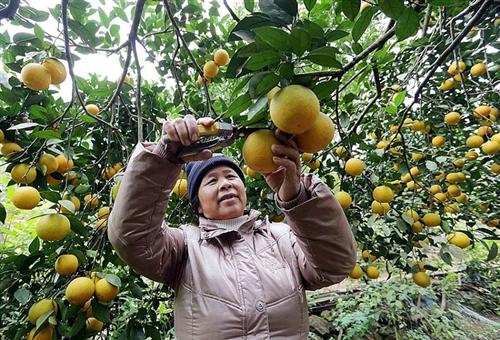EVFTA to have active impacts on budget revenue
EVFTA to have active impacts on budget revenue
Vietnam will have to curtail 48.5 per cent of import tariff lines from the EU right after the EU-Vietnam Free Trade Agreement takes effect. Ha Duy Tung, deputy head of the Department of International Co-operation under the Ministry of Finance, explains to VIR's Manh Bon why the landmark deal would have a positive impact on budget revenue.

Ha Duy Tung, deputy head of the Department of International Co-operation
|
Tariff cuts mean reduced collections from export-import activities, from there having adverse impacts on the budget. Why did you say the EU-Vietnam Free Trade Agreement (EVFTA) would have a positive impact on budgetary contributions?
With common FTAs, import tariff cuts range from 87 to 92 per cent, except the ASEAN Trade in Goods Agreement (ATIGA) that allows cutting 98 per cent of tax lines by the end of the implementation roadmap (2018).
For new-generation FTAs like the EVFTA, tariff cuts and reductions could surpass 98 per cent of the tax lines by the end of implementation roadmap with a faster tax reduction process. In addition, new-generation FTAs also feature commitments on cutting export tariffs and the implementation of non-traditional commitments related to labour, trade union, public procurement, environmental protection, among others.
With the EVFTA, Vietnam commits to removing import tax lines right after the deal comes into force after the approval of the National Assembly (expected this June) with 48.5 per cent of tax lines, equal to 64.5 per cent of the import value from EU.
| For new-generation FTAs like the EVFTA, tariff cuts and reductions could surpass 98 per cent of the tax lines by the end of implementation roadmap with a faster tax reduction process. |
After seven years, Vietnam has to remove 91.8 per cent of import tax lines, equal to more than 97 per cent of import value from the EU, and after 10 years, tax reduction level will reach 98.3 per cent, equal to 99.8 per cent of the import value from the EU.
The EU is the fifth-largest import market of Vietnam, and tariff cuts will not have big impacts on budgetary revenue because FTAs only commit to import tax cuts, therefore import items still bear value-added tax, many kinds of goods such as tobacco, liquor, automobile, and big displacement motorcycles also incur excise tax, and some others such as petroleum suffer environmental tax.
Therefore, tax cut and reduction under the EVFTA would have active impacts on budget revenue as import value from the EU will go up. Additionally, as the main import items from the EU often are often subject to high duties and as Vietnam will lower import tariffs following a roadmap, the implications from lower tax revenue due to import tariff cuts and reductions in the first years of EVFTA implementation would be insignificant.
EU is Vietnam’s second-largest export market. With the EVFTA, Vietnam also needs to slash export duties. Will this affect budget revenue?
Vietnam’s tax cut and reduction commitments under the EVFTA are similar to those of the Comprehensive and Progressive Agreement for Trans-Pacific Partnership (CPTPP).
Specifically, Vietnam commits to removing export duties on goods bound for export to the EU or markets under the CPTPP, following a roadmap extending to 15 years. Furthermore, as most of Vietnam’s exports are tax-free, tax cuts and reductions would have minor impacts on budgetary collection. Besides, regarding major export items subject to export duty like crude oil and coal (except coke), Vietnam can still maintain export duty under the commitment, so that there will be no impact in this regard.
Besides traditional tariff cut commitments, new-generation FTAs also involve non-traditional regulations that are assessed as technical barriers to import. With these barriers removed, economic experts assumed that Vietnam would not benefit much from the EVFTA. How do you see this?
All countries but one have imposed requirements on environmental protection, animal or vegetation quarantine, food sanitation, or social responsibility. The more developed the nation, the higher the requirements are.
Such requirements are applied to imports from all countries, regardless of them having signed FTAs or not. Therefore, it is inadequate to say that the EU has erected technical barriers to limit imports from Vietnam after the EVFTA’s enforcement.
Right after the agreement comes into force, the EU will remove tariffs for around 85.6 per cent of import tax lines, equal to 70.3 per cent of import value from Vietnam. After seven years, 99.2 per cent of tax lines will be annulled, equal to 99.7 per cent of Vietnam’s total import value. To enter this demanding market, Vietnamese exports, however, must meet very strict requirements on workplace safety, environment, and sanitation, among others. If they fall short of the requirements, Vietnamese exports will be subject to tax as usual.
























